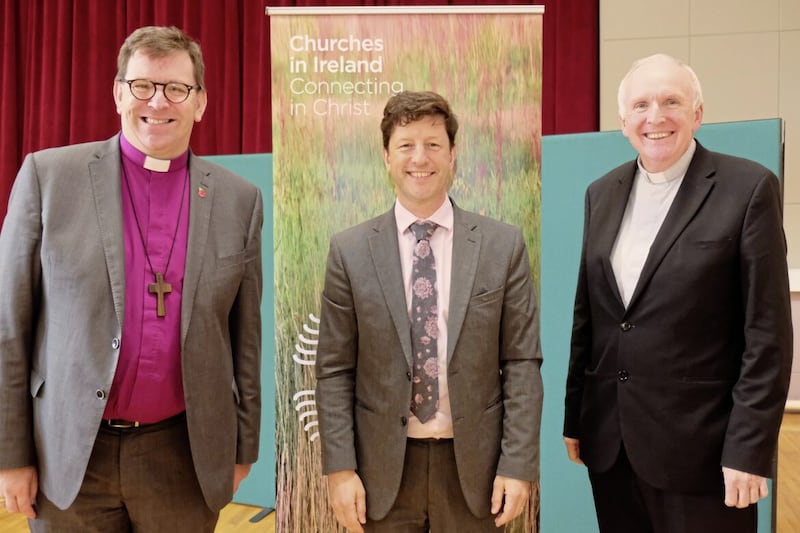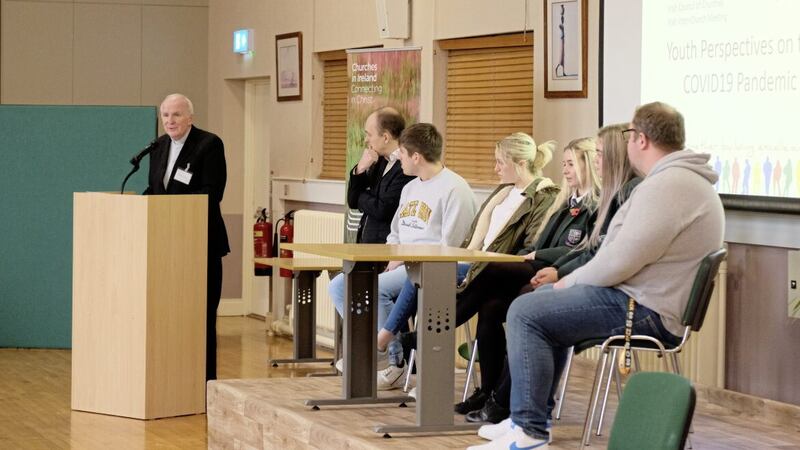IN the wake of the Covid pandemic, the society churches seek to serve has changed dramatically. So too has the nature of our churches themselves.
Taking the theme of 'Creatively reconfiguring our post-pandemic understanding of church', representatives from across the island gathered at Dromantine Conference Centre outside Newry this month for two days of reflection on the challenges and opportunities ahead.
Following an opening welcome from Irish Inter-Church Meeting co-chair Bishop Brendan Leahy, Professor John Fitzgerald from Trinity College Dublin traced the societal story from January 2020 to today.
This included an analysis of the impact of the Covid-19 pandemic and the challenges arising as a result of climate change and the cost of living crisis.
Notwithstanding the understandably diminished power of the churches' voice in a more secularised society, Prof Fitzgerald nevertheless encouraged churches to continue to speak publicly, and with humility, saying what they believe is the right thing to do.
In subsequent discussions, representatives reflected that politicians have a challenging task in 'selling' the need for longer-term policy initiatives such as those pertaining to climate justice.
There is a role for churches to support this by using their voice to contribute in public discourse with a concern for the common good of all people including future generations.
Participants then reflected on a changing local church, led by Breige O'Hare, who provided opportunities to prayerfully consider the impact of these challenging times on those working in ministry at local level.
She focused in particular on the importance of the space we create for people to deepen robust, honest relationships with Christ and with each other in these anxious times. Without this space we are not equipped to bring comfort and hope.
When people are anxious there is a tendency to blame - and the targets of that blame tend to be people in authority or people who are vulnerable. If churches can learn to hold a space for emotional connection and presence, perhaps this tendency to blame can be mitigated through an experience of Jesus with us, in the knowledge that God cares about us personally and how life is impacting on us.
While the Covid-19 pandemic has affected us greatly on this island, its impact for our brothers and sisters in the global church has been significantly different – it was often one amongst many crises.
Speakers Bob Kikuyu of Christian Aid (Kenya) and Dr Conchita Reyes of Trócaire (Guatemala) shared about the situation in their countries. In many churches dependence on in-person tithing meant that they were not able to respond to the impact of loss of employment, increase in domestic violence, and drug use amongst teenagers that were the result of Covid-necessitated lockdowns.
Many church-run social services could no longer operate. Since the easing of restrictions the nature of church has changed, with less-centralised authority structures and an increase in people meeting in neighbourhood house churches.
A panel discussion heard about the grassroots realities in Irish churches, and specifically what the impacts have been on churches that have more recently joined the Irish Council of Churches.
Fr Anish John (Indian Orthodox) and Pastor Dare Adetuberu (Redeemed Christian Church of God) explained that because a disproportionate number of their members were deemed essential workers, they were often doubly-alienated, both as many of them contracted Covid, whilst often keenly feeling their separation from family members in other parts of the world.
Ruth Garvey-Williams, editor of Vox Magazine (vox.ie), spoke about the 'Finding Faith Tour' she undertook in May, travelling all around Ireland visiting churches, Christian ministries and individual Christians from across the spectrum of denominations.
She observed that the churches which are thriving are those which have embraced the changes in society and themselves, and especially the call to 'be the church', and not just 'go to church'. She called on the churches to respond in faith, and that it is in embracing weakness that God's glory is revealed.
Finally, a panel of young people from YouthLink shared their perspectives on the Covid-19 pandemic, and its effects on their day-to-day and social lives.

They considered what churches can do to better meet the needs of younger people. Often churches focus on creating 'content' for young people - while resources and programmes are useful and necessary, the panellists emphasised that connection has to come before content.
Without an inter-personal connection, where care, interest and compassion are shown, the impact of programmes and activities will be greatly diminished.
The meeting closed with a reflective session on 'What the Spirit Saying to the Churches', facilitated by IICM co-chair Bishop Andrew Forster, who concluded by noting that we have all been through the same storm, but have certainly not all been in the same boat. Some were on an ocean liner, impervious to the waves; some on a small rowing boat, tossed and turned but still upright; and many have been desperately clinging to a piece of driftwood.
But Jesus says "take courage, do not be afraid" – God has not been taken by surprise, and out of the peace that passes understanding, there was a sense that the churches in Ireland can move from "come and see" to "go and be", to meet our brothers and sisters in their place of need.
Damian Jackson is general secretary of the Irish Council of Churches and co-secretary of the Irish Inter-Church Meeting. Megan Ross is the communications assistant of the Irish Council of Churches. irishchurches.org
The Irish Inter-Church Meeting emerged from the 1973 Ballymascanlon talks between the Irish Council of Churches - whose members include Protestant, Orthodox, Reformed and Independent church traditions - and the Catholic Church.








